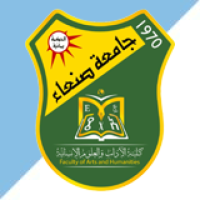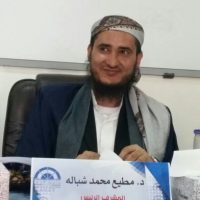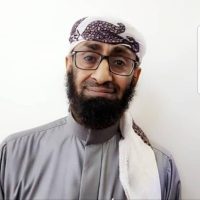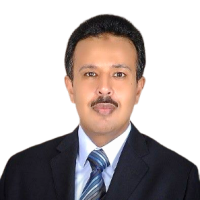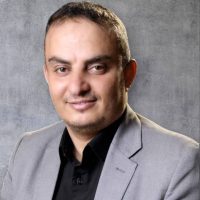
Hoda Ali Al-Emad
Professor
Personal Information:
- Full Professor of Comparative Jurisprudence and Inheritance (Sharia Judiciary and Inheritance Laws)
- Assistant Vice-Rector for Graduate Studies
- Dean of the Academic Development & Quality Assurance Center (ADQAC), Sana’a University.
- Head of Islamic Studies Department, Faculty of Arts, Sana’a University.
- Professor at undergraduate and postgraduate levels, Faculty of Arts, Sana’a University.
- Former Assistant lecturer at the Faculty of Law, Taiz University.
- Holding an Associate Professor degree from both Taiz University and Sana’a University.
- Authored and submitted over thirty works to international platforms through various links, including البروفيسور/ هدى علي يحيى العماد الباحث العلمي (Google Scholar)
- Awarded more than five scientific and academic trophies, seventy-five diverse certificates of appreciation from public and private universities, and over ten certificates for community participation.
- – Contributed, participated and supervised the requirements of international and national accreditation of Sana’a University programs in full institutional and programmatic accreditation for all faculties of the university, which includes more than four hundred programs.
- – Participated in the supervision and follow-up training of all faculties of Sana’a University in more than five hundred academic workshops that pour into the educational process, improvement, development, scientific research and community service.
- Supervised and participated in quality and academic development activities at Sana’a University, including the specification of all programs—exceeding four hundreds and more than eight thousands courses at the Bachelor’s, Master’s, and Doctorate levels.
- Played a leading executive role in the self-evaluation process of all programs at Sana’a University across its faculties and programs as part of the Ministerial Committee’s executive team for institutional accreditation at the university.
- Oversaw and monitored over ninety publications from the Academic Development Center at Sana’a University, significantly contributing to the dissemination of a culture of quality within the university and improving its ranking.
- An academic reviewer at several universities.
- Accredited academic examiner in numerous public and private universities for master’s and doctoral theses.
- Main supervisor for over fifty doctoral and master’s theses
- A member of the Higher Curriculum Committee at the Ministry of Education.
- A consultant at the Ministry of Education for Arabic language and Islamic studies.
- A member of the national team entrusted with the task of developing the National Standard Content for University Requirements.
- Received the Best Teacher Shield from several universities.
- Appointed as head of the Islamic Studies Department in more than five private universities.
- Participated in numerous educational programs affiliated with both Ministry of Education & Ministry of Higher Education (as indicated below).
- Received over twenty-five academic certificates of appreciation from various public and private universities.
- Chairperson of the Female Academics Forum.
- Head of Women’s Unit at the University Education Department.
- Head of Inspection and Control at the Female Academics Forum.
- A member of the Cultural Front.
- A member of the Human Rights Front.
- A member of the Awareness and Law Bloc.
- Chairperson of Pioneers of Justice Organization for Development and Rights.
- Chairperson of Will and Give Union for Development and Rights, which includes approximately twenty organizations with female leadership.
Qualifications:
- Full Professor specialized in Comparative Jurisprudence (Sharia Judiciary and Inheritance Laws)
- A PhD degree with distinction, attaining first-class honors from Sana’a University, Faculty of Arts in Comparative Jurisprudence, based on a dissertation titled (Shariah Predeterminations: A Comparative Study)
- An MA degree with distinction from Sana’a University, Faculty of Arts, Department of Islamic Studies, specializing in Inheritance Laws.
- Achieved the first position nationwide in high school.
Publications and Scholarly Research:
- Judiciary in Islam
- Causes, Conditions, and Impediments of Inheritance in Islamic Jurisprudence (Part One).
- Causes, Conditions, and Impediments of Inheritance in Islamic Jurisprudence (Part Two).
- Legitimate Estimates in Judiciary and Jihad: A Comparative Jurisprudential Study (Part One).
- Legitimate Estimates in Judiciary and Jihad: A Comparative Jurisprudential Study (Part Two).
- Extremism, Exaggeration, and Accusations of Apostasy in Islamic Sharia.
- Lectures on Islamic Creed (A Course Book for Master’s Students at Sana’a University).
- Sunni and Innovated Divorce: A Comparative Jurisprudential Study with Yemeni Law.
- Transfer of Guardianship in Women’s Marriage: A Comparative Jurisprudential Study with Yemeni Law.
- Wife’s Medical Expenses: A Comparative Jurisprudential Study with Yemeni Law.
- Consensus Issues Necessary for a Jurist to Know According to Ibn Al-Murtada.
- Issues Named in Islamic Inheritance Calculations.
- Lectures in Islamic Creed.
- Normalization with the Israeli Enemy and Its Impact on Islamic Reality: A Comparative Jurisprudence Study.
- Jurisprudence Principles among Imams of Zaidi Sect.
- Foundations and Principles of Scientific Research: Practical Applications on Report Preparation and Manuscript Verification.
- Islamic Culture (Our Sharia – Our Civilization).
- Women’s Access to Justice from an Islamic Perspective.
- Arab-Israeli Conflict (A university requirement co-authored book).
- National Culture (A university requirement co-authored book).
- Islamic Culture (A university requirement co-authored book).
- Women’s Contribution to Economic Development in line with the Quranic Project of the Martyred Leader: An Analytical Textual Reading.
- Convergence and Divergence between the Purposes of Zakat and Charity.
- Methods and Means Employed by the Zionist and American Enemies in Targeting the Nation: Normalization as a Model
- Impact of Normalization on the Arab and Israeli Reality: Clarifying the Dimensions and Nature of the Conflict and Its Effects on the Palestinian Cause.
- The Overflowing Abundance in the Science of Inheritance (Part One).
- The Overflowing Abundance in the Science of Inheritance (Part Two).
- The Role of Total Quality Management in Combating Corruption.
Academic and Administrative Experience:
Held multiple administrative positions:
- Dean of the Academic Development and Quality Assurance Center at Sana’a University.
- Assistant Vice-Rector for Graduate Studies.
- Head of Islamic Studies Department, Faculty of Arts, Sana’a University.
- Assistant Director of Total Quality Management at Saba University
- Head of Distance Education Department at Yemen University
- Head of Islamic Studies Department, Saba University.
- Head of Arabic Language Department, Saba University.
- A member of Academic Accreditation and Quality Assurance Unit in multiple universities.
- A member of Higher Curriculum Committee at Ministry of Education.
- A consultant at Ministry of Education for Arabic language and Islamic studies.
- A Former Educational Supervisor at Ministry of Education.
- An administrative supervisor at Ministry of Education for many years.
Educational Seminars and Training Workshops:
- Continuously and actively participating in a series of Arab and local seminars focusing on cultural, social, and political subjects. The most recent involvement includes serving as a member of Curriculum Development Committee, responsible for formulating a comprehensive vision for selecting Islamic curricula tailored to students of Islamic studies and Sharia, with a focus on promoting the principles of moderation and rejecting extremism.
- A specialized course on Arabic language as both a trainer and trainee.
- A methodological course on curriculum development.
- A comprehensive educational course for senior educational supervisors
- A management and supervisory training course.
- Led a discussion of new curricula
- A course on Modern Teaching Methods.
- Engaged in more than five educational courses, actively participating as both a participant and a trainer in educational guidance.
Scholarly Contributions at Academic Accreditation and Quality Assurance Unit:
- Participated in the First introductory workshop on academic accreditation and quality assurance in Yemen, held at Council for Academic Accreditation and Quality Assurance affiliated with Ministry of Higher Education (January/2013).
- Served as a member of the National Team for Developing the National Standard Content for University Requirements, chairing the Islamic Culture Committee.
- Worked as a member, rapporteur, and author in the Islamic & National Culture Unit.
- Conducted a training course titled (Excellence and Advancement in Scientific Research) at The Knowledge and Action Foundation for Development (February 2011).
- Participated in developing the specification of academic programs and study courses for Saba University’s Undergraduate and Master’s degrees in the Faculty of Law, based on the standards of the Council for Academic Accreditation and Quality Assurance (March/2014).
- Conducted a training course titled “Methods and Techniques of Modern Teaching” at Knowledge and Action Foundation for Development (May 2012).
- Authored more than fifteen academic and scientific publications.
Field Participation as Part of Community Engagement through Woman Pioneers of Justice for Development and Rights (previously known as Al-Dameer):
- Established labs and exhibitions for Pioneering Productive Families (Self-Sufficiency Pioneers).
- Contributed to numerous projects that address women’s issues, providing legal support to them as much as possible through:
- Engaging with decision-makers to improve legal legislation in certain specific matters that have disadvantaged women (such as stopping child marriage, obligatory wills, and determining the nature of inheritance).
- Contributing to a project that provides livelihood opportunities through a permanent exhibition for productive families, which includes more than 2,000 productive families.
- Contributing to implementation of certain health projects specific to women within the activities of the Justice Pioneers.
- Providing legal consultation to women and attempting to establish a group of advocates for women’s issues to provide legal support in court.
- Participated in several specialized seminars that aim to reduce injustice against women in general and Yemeni women in particular, including the following important topics:
- Unjust customs and their codification regarding women’s inheritance, apart from the principles of Islamic law.
- Legal aspect of obligatory wills as one of the main reasons for depriving women of some of their rights.
- Depriving women of various types of endowments as a vivid example of the codification of women’s oppression in the Yemeni legal system.
- Understanding the concept of customary marriage apart from the rights of marriage according to religious and legal principles, using Yemen as a case study.
- Participated in a seminar organized by “Qantara” foreign affairs magazine with specialists in archaeology and history of Arabian Peninsula on true causes of internal conflicts and external aggression in Yemen from various aspects (political, social, sectarian, and regional).
- Participated in seminars held at the Inclusive Development Research Center.
- Contributed to supporting internally displaced persons (IDPs), particularly displaced women in Al-Sininah area in the Capital Secretariat (Amanat Al-Asimah).
- Conducted multiple training courses for displaced women to acquire certain handicraft skills that can help them achieve partial financial independence.
- Conducted a comprehensive census and encouraged enrollment of children, both boys and girls, of IDPs to complete their education, and coordinated with relevant authorities in the Ministry for an appropriate admission process.
- Contributed to reserving university seats specifically for displaced women to complete their education.
- Contributed to encouraging and enrolling female cadres from underprivileged governorates in educational and university seats, including postgraduate programs, in various disciplines.
- Contributed to addressing the needs of displaced women who face income shortages, providing them with social and material projects.
- Organized some psychological support workshops in several gathering centers for displaced women.
- Performed both direct and indirect coordination for tracking the academic progress of displaced female students at Sana’a University, as well as students from underprivileged governorates.

